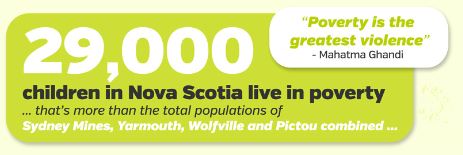Today is the International Day for the Eradication of Poverty. There is lots of work ahead of us before we achieve that goal.
Poverty rates in Canada are growing and the income gap is widening as more and more of the working force are working for minimum wage, or less than previous years due to the rising costs of living. The most recent report card on child and family poverty in Nova Scotia reports that the child poverty rate in Nova Scotia is 17.3%; the fifth highest in the country.

Children and their parents are living in the same low income circumstances and are our most vulnerable citizens, and as Lesley Frank, author of Nova Scotia’s report card, says, they are dealing with the “lack of food, poor housing, cold houses, isolation, and lack of opportunity, worry and despair”. She goes on: “Too many families [are struggling] to make ends meet and the ends are not meeting”. Parents go to work, but with the rising costs of living and stagnant incomes, inadequate social programs, and governments who turn a blind eye, the poverty and social injustice continues.
“A focus on child poverty remains important because long-term inadequate material resources, income inequality and lack of opportunity are major barriers to the healthy development of children, compromising their long-term health and educational outcomes,” according to Frank.
Educators are all familiar with Maslow’s Hierarchy of Needs and the effects of the first four needs (biological and physiological, safety, love and belonging, and esteem) being met, or not being met, have on cognitive needs. When a child is using what little resources they have to survive, it is much more difficult for them to develop and achieve academically. There is lots of research to back this up: “The strongest predictor of student performance on achievement tests is socio-economic status, which is why it is a mistake to believe that the scores tell us about school quality when really they are reflecting affluence or poverty”.
The research on poverty influencing academic achievement is not meant to be deterministic. Of course there are going to be some students who overcome social barriers and perform well, just as there are some students who have adequate, or an abundance of resources to access and support their academic achievement, but struggle. Yet, these stories are not plentiful and the generalizable trends of poverty influencing academic achievement are powerful. Researchers in the United States found a direct correlation between family household income levels and SAT scores – as the income levels increased, so did the SAT scores. Children living in low income circumstances, have less resources to access to support their learning and development. It is estimated that students without adequate resources lose two or three months of knowledge and skills every year over the summer months. Every year, this loss of knowledge and skills compounds and widens the achievement gap further.
The quality of education in Nova Scotia or any province cannot be measured with data collected from provincial assessments, nor should the results be used to drive educational decision making; those numbers, at best, can only tell a small part of the story of schools and the individual students. The data from the assessments are static and are restricted in their value without knowledge of the individual student’s context. What I find extremely concerning, is the weight government and school boards give to the data to drive educational decision making.
The provincial assessment results offer government and school boards a very convenient set of data to base their decisions on – but at what cost? The attention given to the data by the media and government creates a smokescreen, covering the most pressing issues, like poverty. Society needs to recognize that they are continually being redirected by the media to pay attention to the superficial issues, instead of the complex, crucial social issues, like poverty, that have the biggest impact on our province’s sustainability and growth. In order to make meaningful, long-lasting, successful educational decisions, the whole story and context of education in this province is needed. As we become more informed of the pitfalls behind our educational decision making, but move forward in the same manner disregarding our new awareness and the evidence in our midst, then we become very negligent decision-makers.
Student achievement is complex, and unfortunately, society as a whole is much more inclined to buy-in and respond to complex issues with simple sets of data, simple explanations, simple interventions, and so on. Using provincial assessment data is quantitative – people generally have faith in numbers and can follow the linear approach to proposals and explanations of educational reform. However, education is not a commodity and schools are not businesses. The education system is founded in social structures and is very complex. Research shows that the influences on student success, academic achievement, engagement and life-long learning is embedded in an entire social context of external and internal factors. When making educational decisions the government could start acknowledging the social determinants to health, or better yet, wellness. Moreover, as one researcher concludes: “Ultimately, great teachers make great schools, but great teachers can’t do it alone – they require the support of an equitable society. If we are not careful, we risk misinterpreting the scores, and instead of waging war on poverty and inequity, we end up waging war on teachers and schools.”
Shelley Morse is the current President of the Nova Scotia Teachers Union. This blog is an edited version of an article that appeared in The Teacher, October 2014, Volume 53 Number 2, Page 4 & 13
This blog is the fourth in CCPA-NS’ series called “Progressive Voices on Public Education in Nova Scotia.”






